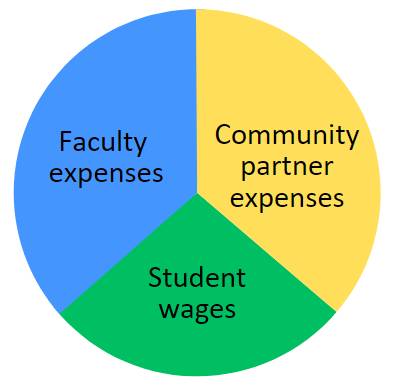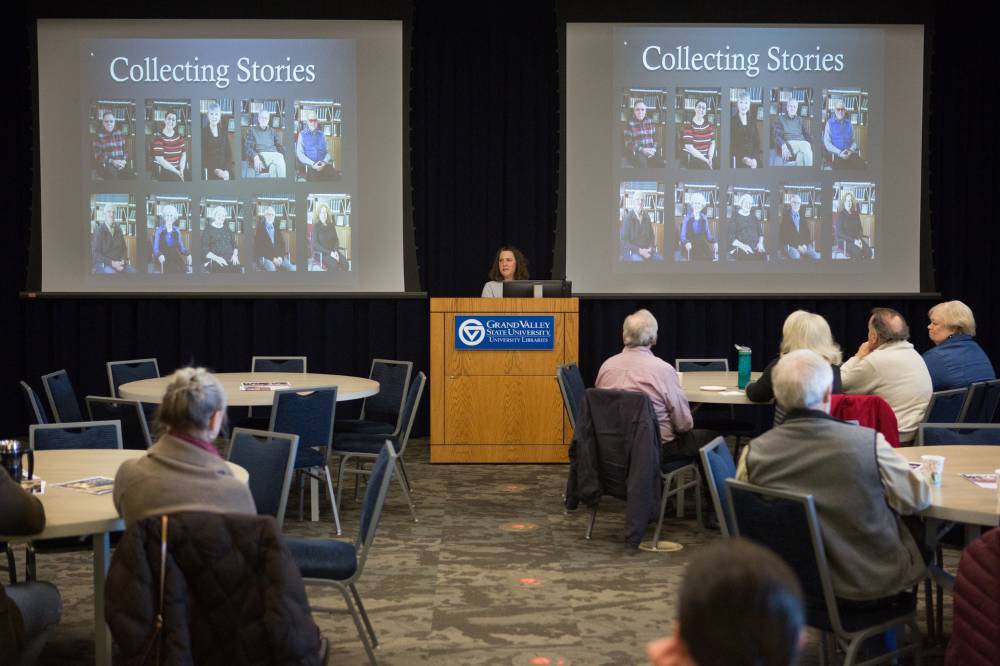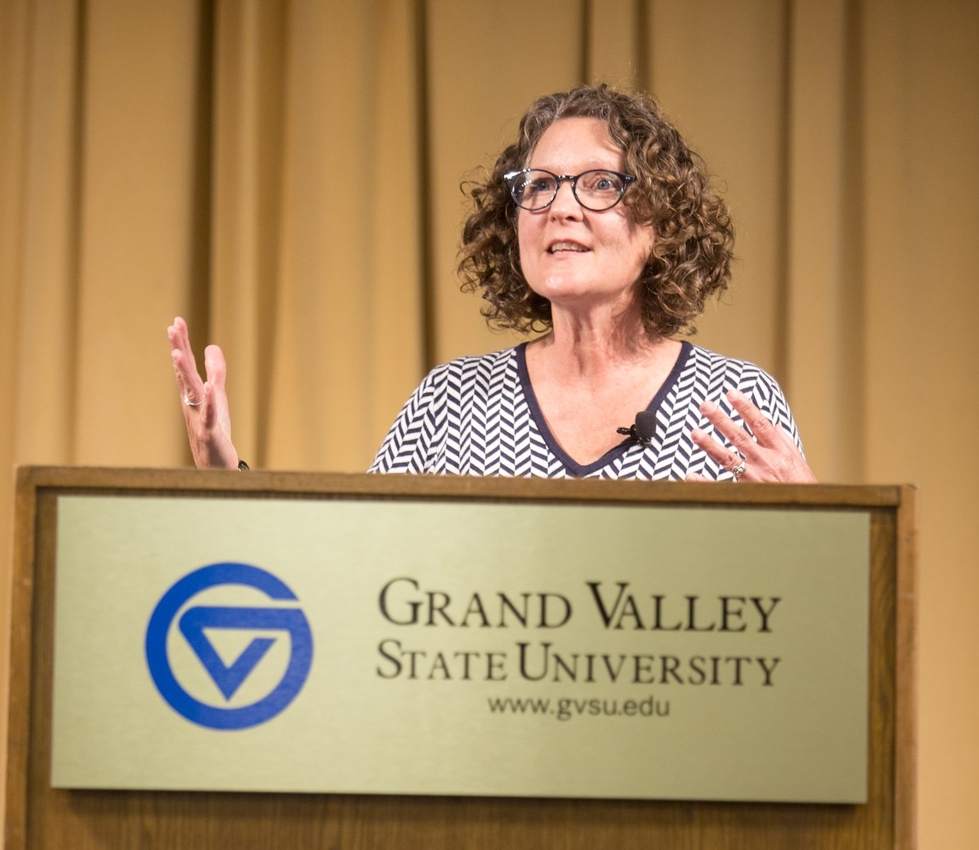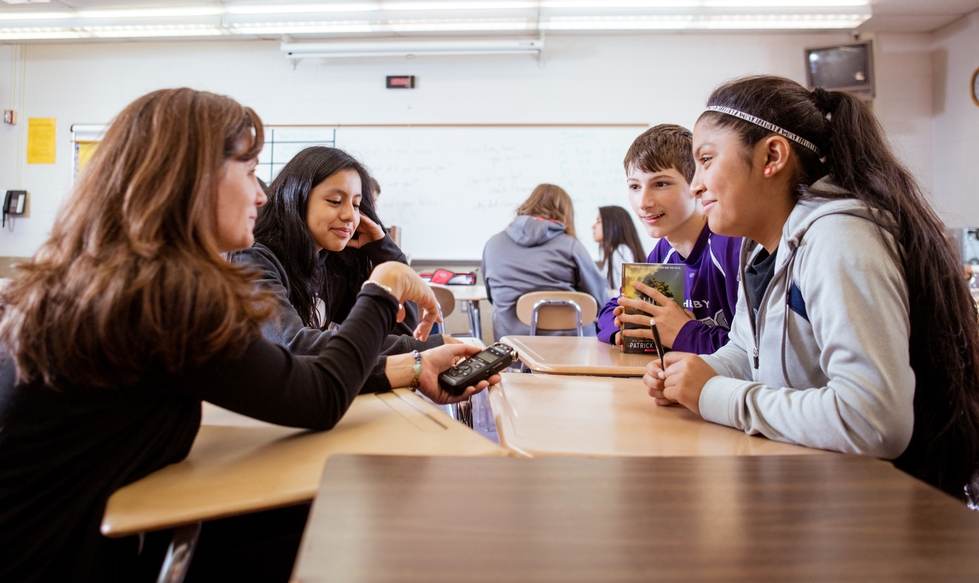Community Collaboration Grant
Applications now open for the 2023-2024 academic year.
Download a PDF version of the 2023-2024 call for proposals.
Email application packages to [email protected] by October 2, 2023 or March 25, 2024.
The Kutsche Office of Local History helps give voice to West Michigan's diverse communities through history. The Office uses historical perspective, deep community connections, respect for storytelling, and academic rigor to strengthen communities throughout West Michigan. It does so by bringing together community members, civic institutions, instructors, staff, students, historians, and others to facilitate conversations and develop programs that leverage the lessons learned from the region’s past.
The Community Collaboration Grant will be awarded up to two times in the 2023-2024 academic year, with due dates of October 2, 2023 and March 25, 2024.
October 2023 applicants are eligible to begin disbursement in January 2024; March 2024 applicants can begin in either May or September 2024. Grantees have one calendar year from the beginning of their disbursement to utilize all funds.
This granting cycle provides up to $11,000 total to Grand Valley State University instructors working on projects that help build connections between the university and community. It also seeks to provide meaningful experiential opportunities for students, providing additional wages to help up to two student assistants learn the practice of history and the ethics of engaging with public history work.
At least half of the requested funding (excluding student wages) should be earmarked to directly benefit the community institution. For example: a request for $2,500 for student wages and $3,000 for faculty expenses could request anywhere from $3,000-$5,500 to directly benefit the community partner institution.
See the full Call for Proposals for examples of eligible instructor and community partner expenses.

How to Apply
Application Package
Please submit a full application package to [email protected] by the appropriate deadline.
A full application package includes:
1. Proposal, detailed in the adjacent column.
2. Current curriculum vitae.
3. Letter of support from community partner (including their contact information).
4. Letter of support from instructor's department chair or unit head.
October 2023 applicants are eligible to begin disbursement in January 2024; March 2024 applicants can begin in either May or September 2024. Grantees have one calendar year from the beginning of their disbursement to utilize all funds.
Proposal
The bulk of the application package is the Proposal, which should be 3-5 pages long and include the following:
Section 1: Abstract and Timeline
Provide a clear, concise description of your project and goals. Tell us where you are in the project and a rough outline of the project’s development. Demonstrate how this project aligns with the mission of the Kutsche Office and reflects a sustained commitment to nurture a relationship with your community partner.
Section 2: Community Impact
Describe how this project will impact the local community. Approximately half of the grant funding that is not earmarked for student wages should be earmarked to directly benefit the community institution. Include explanations of what role your community partner will play, what level of planning, participation, and oversight your community partner will provide, and what will happen to the outputs and community relationships once the project is complete.
Section 3: Experiential Learning
Outline how you will include Grand Valley State University student(s) in your project: the type of work they may do, the benefit this work will have toward their educational goals, the significance of student support in this project, and what their training and guidance will look like. If you are requesting additional funding to cover a student assistant's wages, please note it here and describe their role.
Section 4: Budget
Outline your full project budget, noting where you intend to utilize these grant funds. Explain the purpose of any services, materials, and/or supplies. Approximately half of the grant funding that is not earmarked for student wages should be earmarked to directly benefit the community institution. If you are requesting additional funding to cover a student assistant's wages, please note it here and make sure a description of the presumptive student assistant's work is mentioned in the Experiential Learning section. Please note if any aspects of your project are contingent upon outside funding.
Eligibility
- Any current GVSU instructor is eligible to apply, including adjunct, temporary, tenured, tenure-track, and visiting professors. Grantees must be employed with GVSU as an instructor for the duration of the grant cycle.
- Collaboration with at least one community partner is required. Grantees must have an agreement with the community partner prior to applying for the grant. Community partners are any affiliation group that is not directly housed with or funded primarily by GVSU. Examples include a local library or history museum, a camp or care facility, a civil or human rights organization, an art collective, a preservation organization, and so on.
- Direct, hands-on involvement from at least one enrolled Grand Valley State University student is required. Student involvement could include having an entire class contribute to the project as part of assigned coursework. Examples of student involvement include transcription, oral history training, designing museum materials, and so on.
- Additional funding may be provided to hire an enrolled GVSU student for 8-10 hours/week, for up to two semesters. Potential student employees are subject to GVSU's student employment policies.
- Examples of eligible expenses include, but are not limited to: purchasing supplies, assisting with community partners’ expenses, speaker or professional consultant fees, offsetting costs of preservation, translation, or transcription, and support for community events related to the project. Funds cannot be used for the grantee to pay themselves wages.
Terms & Reporting
- Depending on the nature and progress of the project, grantees and/or their student workers may be asked to review materials on research ethics related to oral histories, community collaboration, or other relevant subjects. If this is needed, it will be outlined in the acceptance letter.
- Grant recipients will meet with Kutsche Office staff midway through their granting cycle to provide a general update and so staff can address any concerns or provide assistance.
- Grantees must submit a brief article about their work, written for generalist audiences and including some accompanying visuals, to be shared in Kutsche Office publications.
- Grantees will present their work at a public event hosted by the Kutsche Office.
Past Projects
L’dor v’dor: Oral Histories of the B’nai Israel Congregation
2018-2019 recipient Marilyn Preston with “L’dor v’dor: Oral Histories of the B’nai Israel Congregation”
Marilyn Preston was an associate professor in GVSU's Integrative, Religious, and Intercultural Studies department. "L'dor v'dor" explored narrative identity, queer and critical pedagogy, autoethnography, and the interplay between institutional and personal identity development. The portion of this work funded by the Community Collaboration Grant involved training students to collect oral histories from members of the 130+ year old B’nai Israel Synagogue in Muskegon, Michigan. This project’s goal was to capture a record of the temple, the congregation, and Jewish life in Muskegon. Many of the current temple members had been a part of the B’nai Israel congregation for their entire lives, and have rich memories of growing up Jewish in Muskegon, the rise of Jewish community, and the ongoing disappearance of Jewish life on the lakeshore. Hear Preston reflect on this project, view the resulting archives held in GVSU Special Collections, and learn more about how this project transformed into a full exhibition at the Lakeshore Museum Center in Muskegon, Michigan.

Presenting on student involvement in "L'dor v'dor." Photo by Kristina Bird, Bird + Bird Studios.

How Much Dutch? The Linguistic Landscape of Holland Michigan
2017-2018 recipient Kathryn Remlinger with "How Much Dutch? The Linguistic Landscape of Holland Michigan”
Kathryn Remlinger is a professor in GVSU's English department, specializing in Linguistics. This project focused on the intersection of language use, language attitudes, identity, and tourism in public spaces to understand their effects on what it means to be "local" and on shaping the identity of a city. More specifically, this ethnography explored how people create meaning through and with language in the multimodal linguistic landscape of Holland, Michigan, a small city and tourist destination on the shore of Lake Michigan. In conjunction with the Herrick District Library and the Holland Museum archives, the project examined how language use in the public spaces that make up the city discursively reimagine Holland as a “Dutch” city. This reimagining affects particular ways of understanding larger sociocultural meanings about ethnicity, place, and their relationship to language use and language attitudes.

